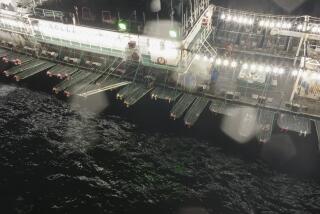Victim of Wrong Information, Navy Captain Testifies
- Share via
SUBIC BAY NAVAL BASE, Philippines — U.S. Navy Capt. Alexander G. Balian testified Tuesday that he would have rescued a boatload of Vietnamese refugees his ship found adrift in the South China Sea if he had been correctly informed of their plight.
His voice sometimes choking with emotion, the 48-year-old Balian told a Navy court-martial that if he had known the desperate conditions aboard the Vietnamese craft, “there is no doubt in my mind I would tow them to my side and embark them. That’s what I did on two previous occasions.”
Balian, of Los Angeles, is charged with dereliction of duty and failing to provide sufficient assistance to the refugees.
His ship, the amphibious transport Dubuque, encountered the refugees’ craft June 9, but Balian decided not to take them aboard. Of the 110 refugees who left Vietnam, only 52 survived and some of them had resorted to cannibalism before they were rescued by Filipino fishermen June 27 after 37 days at sea, U.N. officials said.
Balian testified that his crew gave the refugees 400 pounds of food and 55 gallons of water and added, referring to the survivors: “If it wasn’t for what we did, those people wouldn’t be alive today.
“I am being charged with giving insufficient assistance,” he said. “What is sufficient?” he added, raising his voice. “If I assisted them forever and ever and ever and ever, would that be sufficient assistance?”
When the Dubuque came across the refugees’ junk, Balian said, he ordered his executive officer, Lt. Cmdr. Stanley Halter, to determine if the craft was seaworthy.
Halter, who went by boat to inspect the junk and reported to Balian by radio, told him the refugees said they did not need medical assistance and felt they could continue if given food and water, Balian testified.
Based on poor interpreting, mistaken information and faulty communication, Balian said he made the decision to leave the refugees behind.
“I made my decision like any commanding officer had to,” using the information at hand, Balian said.
“We thought we did a good job. In fact (the refugees) waved happily in thanks” after being given the food and water, he said.
Balian said he later realized his crew had inadvertently given him incorrect information.
He said Halter had told him the refugees said they had been at sea for seven days when it was more like 19, according to later investigation.
He said Halter also said the refugees told him they had had no food and water for three days, although later investigation suggested it was more like a week.
Halter also said the refugees reported they had no engine, although in fact they had a broken one, which Balian said his crew probably would have fixed for them.
Balian also said he was unaware his executive officer had not placed any medics on board three boats sent out to check the conditions on the junk.
He said he looked at the refugees through binoculars from the bridge of the Dubuque, at a distance of between 240 and 600 feet, but could not see any naked refugees on board, nor the degree to which they were emaciated, as depicted in photographs taken with zoom lenses by his crew.
More to Read
Sign up for Essential California
The most important California stories and recommendations in your inbox every morning.
You may occasionally receive promotional content from the Los Angeles Times.









